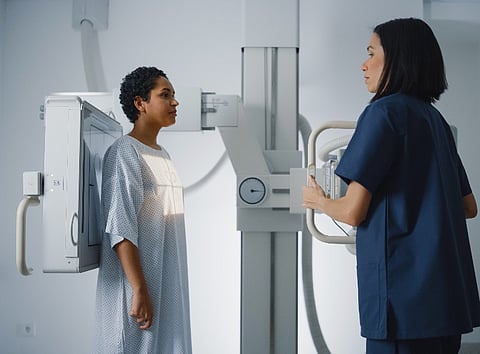WEDNESDAY, Jan. 31, 2024 (HealthDay News) -- A common genetic test to determine treatment options for breast cancer could be leading some Black patients to forego chemotherapy that might have helped them, a new study says.
The test appears to underestimate the benefit of chemotherapy in some Black women because it doesn’t take into account race-based differences in treatment response, the researchers explained.
“The test could be misguiding treatment,” said senior researcher Dr. Kent Hoskins, a professor of oncology at the University of Illinois-Chicago.
The test, known as the 21-gene breast recurrence score, is the most common test used to guide doctors’ treatment of breast cancers fueled by the female hormone estrogen, researchers explained.
All patients with this form of breast cancer, called estrogen receptor-positive breast cancer, receive hormone therapy to block the effects of estrogen on their cancer.
The genetic test helps identify tumors likely to be more aggressive, and thus the women who would best benefit from chemo in addition to hormone blockers.
For the study, researchers analyzed test results and death records for more than 70,000 women with early-stage, estrogen receptor-positive cancer.
The research team found that the genetic test ranked some Black women -- young patients in particular -- as unlikely to benefit from chemo when, in fact, it could have helped them.
The team’s analysis concluded that the genetic test’s cutoff point for recommending chemo should be lowered for Black women, although Hoskins said a larger confirmatory study is needed to tease out the flaws in the test.
The findings were published recently in the Journal of the National Comprehensive Cancer Network.
“The research shows that it may be inappropriate for doctors to use exact cutoffs and tests, regardless of race or ethnicity, because there are underlying differences in biology,” Hoskins said.
Black women’s tumors are less likely to respond to estrogen blockers, which is what researchers suspect is behind the bad advice that the genetic test is producing.
Since hormone therapy isn’t as effective, chemotherapy would help improve outcomes more in Black women than in women who benefit from the hormone blockers alone.
Hoskins stressed that while the new research points to biological differences in cancers between Black and white women, that doesn’t rule out social factors like structural racism as an influence over their cancer outcomes.
Indeed, Hoskins suspects that the same social factors that lead to worse outcomes for Black women in health care could also be causing the biological differences in tumors.
“We believe that it’s actually the same forces that lead to inequities in care that are driving this more aggressive biology,” Hoskins said.
More information
The Breast Cancer Research Foundation has more about black women and breast cancer.
SOURCE: University of Illinois-Chicago, news release, Jan. 29, 2024


